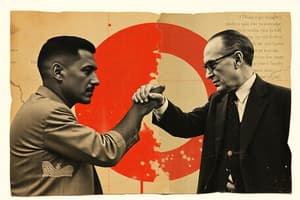Podcast
Questions and Answers
What is the role of diplomacy in international relations?
What is the role of diplomacy in international relations?
Diplomacy is the practice of conducting negotiations between nations to prevent war and find peaceful solutions to conflicts.
Give an example of successful diplomacy during World War II.
Give an example of successful diplomacy during World War II.
Winston Churchill serving as Britain's prime minister and negotiating with Soviet Union leader Joseph Stalin and U.S. President Franklin D. Roosevelt to ensure post-war peace and cooperation among the Allied Powers.
How did nationalism influence the end of colonialism after World War I?
How did nationalism influence the end of colonialism after World War I?
Growing nationalist sentiments led many states to gain independence from colonial powers like Britain, France, Russia, Japan, and the United States.
What historical event led to the end of the Thirty Years War and the establishment of the modern state system?
What historical event led to the end of the Thirty Years War and the establishment of the modern state system?
How did the Congress of Vienna in 1815 impact Europe after the Napoleonic Wars?
How did the Congress of Vienna in 1815 impact Europe after the Napoleonic Wars?
Study Notes
Introduction
The history of human societies has been marked by various forms of conflicts between individuals, groups, nations, and empires. Conflict resolution, international relations, diplomacy, and nationalism have been central aspects of this history. This essay will discuss these four historical concepts in detail.
Conflict Resolution
Conflict resolution is a crucial aspect of any society's development. It involves identifying the causes of disputes and seeking peaceful resolutions through dialogue, negotiation, mediation, arbitration, or litigation. Throughout history, humans have employed numerous strategies to resolve conflicts, including warfare, treaties, alliances, and peace agreements.
One significant example of conflict resolution occurred during World War II when various Allied Powers negotiated the Yalta Agreement in February 1945. This pivotal event helped establish post-war Europe with the United States and Great Britain acting as guarantors against Soviet aggression.
International Relations
International relations refer to the interconnected relationships among states, organizations, and other actors within the global system. These interactions involve cooperation, competition, and conflict over issues such as power, wealth, ideology, security, and resources. Historical examples of international relations can be traced back to the ancient civilizations like Greece, Rome, China, India, Persia, Egypt, Babylon, and others.
Historically, international relations have been shaped by various factors such as geography, culture, trade, colonization, imperialism, world wars, cold war, and the rise and fall of empires. For instance, the Congress of Vienna in 1815 established a balance of power in Europe after the Napoleonic Wars, while the Treaty of Westphalia in 1648 marked the end of the Thirty Years War and led to the modern state system.
Diplomacy
Diplomacy is the practice of conducting negotiations between nations, often with the aim of preventing war and finding diplomatic solutions to conflicts. Throughout history, diplomacy has played a crucial role in shaping international relations and achieving peaceful resolutions to disputes.
An example of successful diplomacy was demonstrated during World War II when Winston Churchill served as Britain's prime minister, negotiating with Soviet Union leader Joseph Stalin and U.S. President Franklin D. Roosevelt to ensure post-war peace and cooperation among the three Allied Powers. Another significant example occurred in 1979 when Egyptian president Anwar Sadat visited Israel, leading to the Camp David Accords between Egypt and Israel.
Nationalism
Nationalism refers to the feeling of pride and loyalty towards one's nation, or group identified by common culture, language, ancestry, religion, or historical traditions. It has been a powerful force throughout human history, influencing individual choices, social behavior, political ideologies, and even wars.
Historical examples of nationalism include the French Revolution, which sparked a wave of nationalist movements across Europe, Asia, Africa, and the Americas. During this time, many people began valuing their identity based on their ethnicity rather than their class or religious affiliations. Similarly, after World War I ended, numerous states gained independence from colonial powers like Britain, France, Russia, Japan, and the United States due to growing nationalist sentiments.
In conclusion, understanding conflict resolution, international relations, diplomacy, and nationalism is essential for comprehending the complex dynamics of human societies through time. As we continue to explore our past, we gain valuable insights into how these concepts have shaped us and inform our present actions.
Studying That Suits You
Use AI to generate personalized quizzes and flashcards to suit your learning preferences.
Description
Test your knowledge on historical concepts such as conflict resolution, international relations, diplomacy, and nationalism with this quiz. Explore pivotal events like the Yalta Agreement, Congress of Vienna, Camp David Accords, and their impacts on global dynamics.




